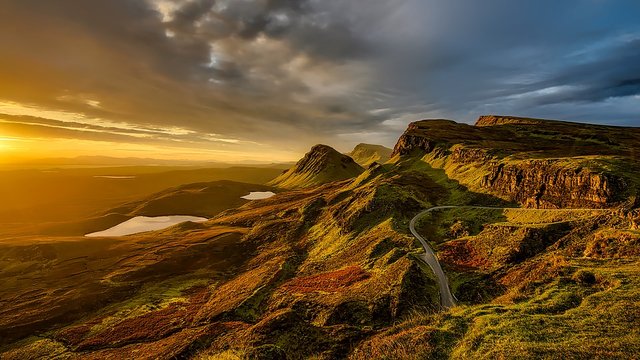
"Scotland is a wild and mysterious place," I thought to myself, as our airplane plane began dropping down through seemingly solid layers of thick cloud cover. As I felt the landing gear grinding into place and still couldn’t see land, I gave thanks for modern navigational equipment. Suddenly, just prior to seeing the landing strip, the clouds unwillingly gave way and miraculously, we were on the ground at Glasgow Airport. The rest of our trip proved to be equally spectacular and mystical in this rugged and sparsely populated country of five million souls.
My boyfriend Paul and I had decided to bring our two adult daughters and two grandchildren with us on our voyage into this almost-English speaking country. After a few days we all were sporting a brogue with words like "aye” and “bonnie” and “wee” with the best of them. My daughter’s last name is Ross from her father, and for three decades I had heard about the Ross clan. She would discover her Scottish/Celtic roots and much more.
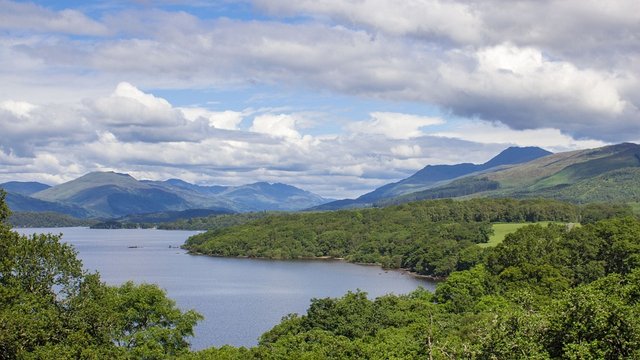
Although we had planned on making this a family trip, we visited a few sacred sites on our adventure in the overcrowded van from hell on tiny, winding Scottish roads. The first day found us traveling on the main road from Glasgow north to Inverness. Eerie Loch Lomond was our roadside companion. We stopped along its banks to photograph one major island, with clouds covering its hilly top, looking quite other-worldly.
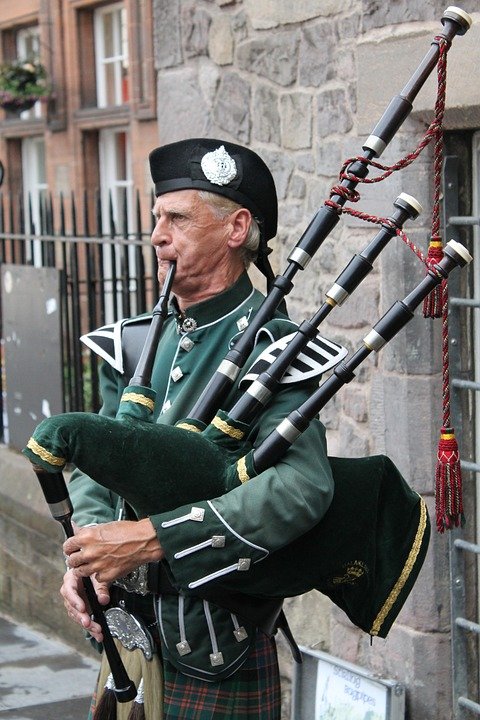
I had earlier purchased a cassette of Gaelic music, which seemed in keeping with the magical scenery laid out before us. During one haunting melody we drove past a miles-long grove of trees which gave me goosebumps and think of Druids. We spotted a bridge near a small town, which looked very Roman but a sign announced it had been built in the 1800's. Water cascaded over a craggy outcropping of rocks, spilling into a fierce river below. Near the cascade I felt drawn to some trees clothed in moss near the water’s edge.
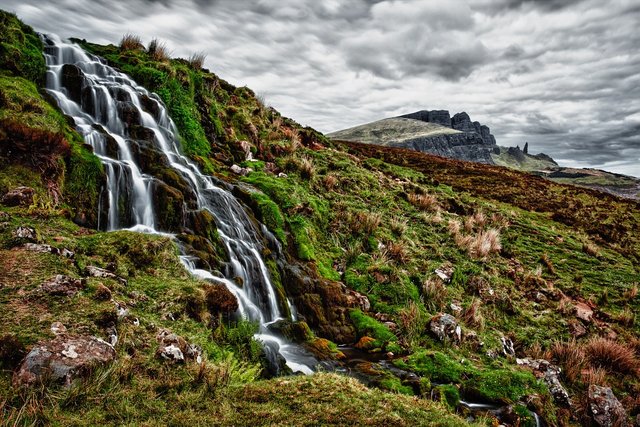
“Welcome, sister,” the trees whispered, as though I was a Druid priestess returning home. "Welcome back.”
I hugged them in response and felt I recognized them, too.
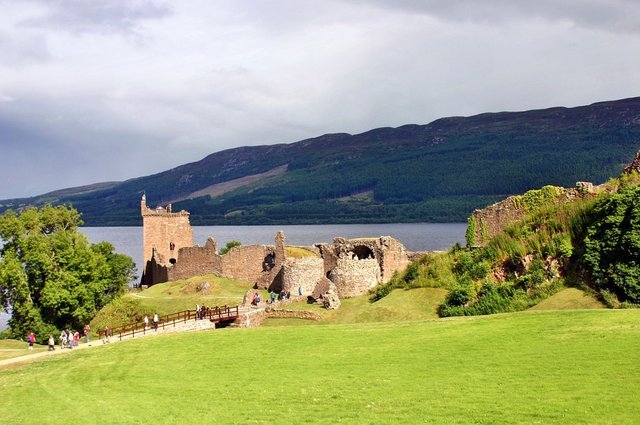
Several days later we stopped at Urquhardt Castle and walked down the steep trail to the crumbling ruins of the castle at the edge of Loch Ness. This was the place where Nessie, the Loch Ness monster had first been spotted, but there was no sign of her while we were there. As we climbed into the high turrets, we could see the lush green countryside all around the castle, impervious to attack except from the Loch. For centuries many battles had been fought there, including one with Braveheart William Wallace. I could hear ghostly soldiers yelling as they attempted to penetrate the castle and saw blood flowing down the grassy banks.
Linda, Paul's daughter, became so nauseous at one stairway, she had to return to the gift shop to recuperate. When I asked her later about her experience, she reported that she seemed to hit a wall of invisible resistance on the path, then suddenly felt quite ill. Was this a past life memory?
We stayed an extra day in Inverness at the foot of Loch Ness, to rest up from our long days of travel and forever getting lost. The next day was to prove a powerful one for all of us. In a guidebook I had purchased I read up on Scottish sacred sites and determined that our route would take us past several of them. Although we were seeing as many castles as possible on our trip, I asked if we could stop at the two sacred sites, and everyone agreed.
Our first destination was the Clava Cairns, less than an hour from Inverness. Fortunately, Clava Cairns wasn’t far from the famous Culloden Battleground where Bonnie Prince Charlie regained his throne, and we found it easily. No one else was around when we parked at the tiny sign announcing the sacred site and walked up to the area; in fact, only one car pulled up the entire time we were there. However, the lack of notoriety belied the power there.
Cairns are burial mounds; the Clava Cairns had three separate mounds topped with stone, with tall stone pillars encircling each one and clusters of ancient trees all around. My usual custom was to approach slowly and reverently, to honor the sacred place. While I was sensing an intense pulse of energy which could be felt emanating from the first cairn from hundreds of feet away, the kids ran over and climbed up on it, thinking it was a megalithic playground. When I finally got to it, the rest of my group had wandered off to the other two. The cairn was approximately six feet high, and perhaps a hundred feet in diameter. (I read later that the cairn was originally roofed over and would have been nine feet high.) There was a twenty-foot tall heel stone facing the passage into the open center of the cairn. I attempted to walk through the entryway, but was stopped by a force which told me I wasn’t allowed in. I was told to draw a design on the dirt at the entrance, three concentric circles with a dot in the middle, which I did. I later found out this design is an old and sacred one in prehistoric cultures, representing the universe.
Then I walked over to the massive heel stone and put my arms around it, my forehead pressed to its stony surface. I felt as though I was transported through the stone, into another dimension, sensing indescribable pictures. I could hear the others return, giggling at me. I was absorbed in the experience for about thirty minutes; meanwhile, Paul's grandson took a photo of me hugging the stone. Later when the photo was developed, it showed a long beam of light coming down from above into me and the stone. After my meditation, I went around the stone circle, touching each stone in turn. None of them were as tall as the heel stone, but each contained immense power and energy.
Although everyone else had explored the other cairns, I hadn’t yet, and strolled along a dirt path to the other two. They were quite mild in energy and vibration compared to the first one. I had the sense that the first cairn was some sort of sanctified priestly place, where many holy ceremonies were held, and that no one but the inititated could attend or even come close. I also felt that the first cairn was much older than the other two. Many of the stones on the third cairn had cup marks of indeterminate purpose carved into their surfaces. My companions seemed anxious to move along and we left the Clava Cairns.
Our next stop was Loanhead of Daviot, another cairn and stone circle. We drove in and around the many rural trails until at last we found it. Loanhead is situated on a hilly site, in the middle of an open field. It contains a low cairn edged with boulders, and a circle of eight stones, a recumbent slab and two flanking pillars. Unlike the potent energy of Clava Cairns, Loanhead was a gentle, serene place, which none of us felt in any hurry to leave. I again approached with honor and this time was invited into the center, and I laid down on the grass. The clouds were sparse that day, and I had the sense I was floating with them in a sky as peaceful as a lake. After a time, I got up and proceeded around the circle, touching and hugging each stone as I did so. My fellow travelers laughed at my actions again. “There goes Lauren, hugging stones!” My intuition told me this was a place of healing and recuperation. Just before we left, my adventuresome daughter climbed up on the recumbent slab, announcing she was Queen of the World. The sun would be setting soon and we still didn’t have a place to stay for the night, so we reluctantly left this peaceful site.
I saw a sign on the main roadway announcing the Maiden Stone, which I spied at the last minute. “Turn here,” I directed Paul, and he did so with a screeching of wheels. Not more than a mile down the tiny cowpath of a road we saw the tall stone near a pasture fence. There wasn’t enough room to park or even turn around, so we slowed the van down enough to view the Maiden Stone. It was an example of Pictish art -- a megalithic standing stone carved with Christian symbols by the later Picts. I was satisfied and we drove on.
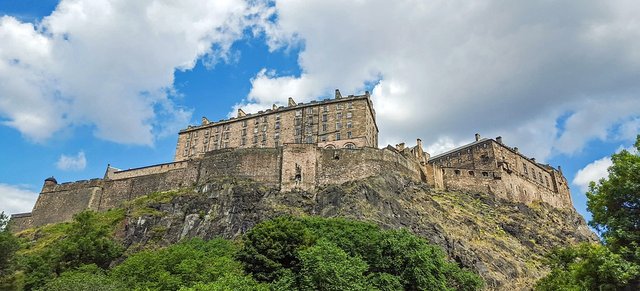
The last significant stop of our journey was in Edinburgh, where we toured the huge fortress Castle high atop an ancient volcanic outcropping. The minuscule Mary Chapel inside the castle is known to be a sacred site, the oldest chapel of its kind in Scotland. The Mary Chapel had been restored and its gleaming new paint seemed incongruous to the rest of the castle, but the tranquil interior was restful and meditative.
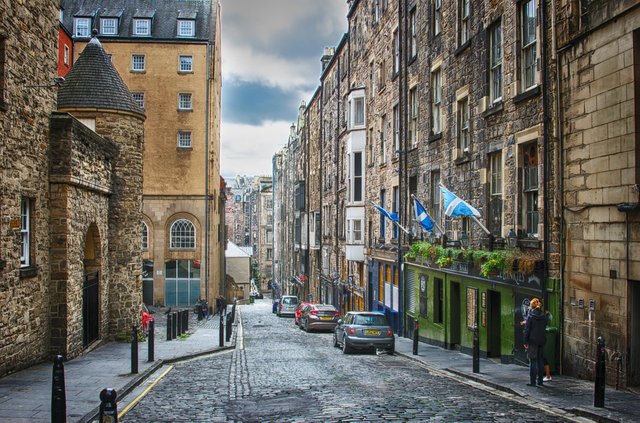
While our daughters and grandchildren trooped off to shop for souvenirs, Paul and I strolled down the Royal Mile to Holyroodhouse Palace, one-time home of Mary, Queen of Scots, stopping for tea and scones on our way. We explored most of the palace, then found a winding column of stairs behind a heavy curtain. As we climbed the stairs, we approached a darkened doorway at the top. I got goosebumps, turned and said to Paul, “This was Queen Mary’s bedroom.” He shrugged.
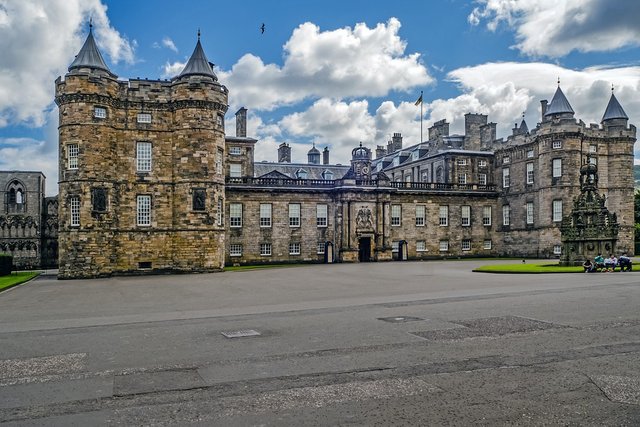
As I walked in, I felt a flood of recognition, more goosebumps and my hair stood on end. A sign at the end of the room proclaimed this was indeed the Queen’s bedroom. Then I told Paul, “But the room isn’t the way it should be,” and I proceeded to explain how Mary would have known it. We proceeded through the small bedchamber, through another small doorway, into a tiny museum of Mary’s artifacts. Displayed on the wall was a portrait of Mary’s room painted as it was in her lifetime -- exactly the way I had described it to Paul!!
Although our visits to these places may seem rather uneventful, even anti-climactic, I didn’t realize the impact of these sites until we returned home. The first thing I noticed is that everyone had become a lot more intuitive, including the kids. As the days and weeks passed, I noticed subtle but important changes in everyone’s personalities, as they became gentler, kinder, and gained a greatly expanded sense of self-esteem.
Then my daughter Andrea seemed to go through what looked like a nervous breakdown. She abruptly broke up with her boyfriend and became anxious, depressed, fearful, unable even to go to work for several months. All these were characteristics that were totally unlike her sunny and cheerful, although shy, disposition. I took her to a meeting of spiritual professionals with me, hoping to get her mingling with people again. I noticed that many individuals came up to her, wanting to talk about their problems, an unusual occurrence as she usually goes unnoticed, staying in the background. When I asked her about it, she said that this was happening a lot, even when she was sunbathing at the beach. People were gravitating to her, not knowing what they expected from her, but wanting to be in close proximity.
When we left the meeting, I asked Andrea how she felt. She said that the meeting felt “sad” to her, which is how I would have described it as well. In an instant I understood what was happening to her. “I think you’ve become psychic and a healer,” I said.
Andrea’s eyes flashed with recognition. “That’s it!” she exclaimed. “No wonder I have such a hard time being with people lately. I can feel what’s going on with them.”
Since that night, Andrea (or Crystal as she wants to be called now) has gone through a complete personality change. She is no longer shy, but outgoing, exuberant and assertive. Her depression, anxiety and fear left as suddenly as they had come. People are seeking her out and she is making new and different kinds of friends while she has parted ways with unsuitable old friends. She is attending classes on learning how to handle her newly-found psychic and healing abilities and is intuiting the use of crystals. Her clear eyes gleam with self-contained power and wisdom. Within a few short months, she has become a new and profoundly spiritual person.
The most important lesson I learned from our trip to Scotland is that sacred sites are extremely powerful, no matter if one performs rituals and meditations, or just walks around taking photographs. All that’s required is to just show up.
(P.S. Crystal recently told me that as she watched me at the Clava Cairns she said to herself, I want to be able to see things and intuit things, too, like my Mom." Be careful what you ask for, especially at sacred sites!)
IN SEARCH OF STONES, by M. Scott Peck (author of The Road Less Traveled), Harcourt, Brace & Company, New York, NY, 1995
SCOTLAND BC, Anna Ritchie, Historic Scotland, Edinburgh, Scotland, 1988
NEOLITHIC AND BRONZE AGE SCOTLAND, P.J. Ashmore, B.T.Batsford Ltd, London, England, 1996
Downvoting a post can decrease pending rewards and make it less visible. Common reasons:
Submit